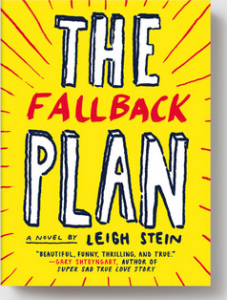Author Spotlight
Leigh Stein Interview (5)
 Leigh Stein’s yellow first novel, The Fallback Plan, is about a girl named Esther who has a degree in acting but has just been coasting since graduation, trying to adjust to a newer, sadder understanding of how the world works. “It was unfair that life was so irrevocable, that nothing could be frozen in time or retracted” she thinks in the final chapter called, appropriately, “Independence Day.” “I loved acting because it was like living inside of a fixed amount of time, looped from start to finish. In rehearsal, I went through the best and worst moments of some woman’s life, again and again, until I’d perfected them.” Now, feeling like a stranger in her parents’ backyard, she sits in the distance and watches the lives of the people around her and it seems like she resolves, at last, to take the long way through her own life. I asked Leigh about that for my last question in this week-long interview (see parts one, two, three and four).
Leigh Stein’s yellow first novel, The Fallback Plan, is about a girl named Esther who has a degree in acting but has just been coasting since graduation, trying to adjust to a newer, sadder understanding of how the world works. “It was unfair that life was so irrevocable, that nothing could be frozen in time or retracted” she thinks in the final chapter called, appropriately, “Independence Day.” “I loved acting because it was like living inside of a fixed amount of time, looped from start to finish. In rehearsal, I went through the best and worst moments of some woman’s life, again and again, until I’d perfected them.” Now, feeling like a stranger in her parents’ backyard, she sits in the distance and watches the lives of the people around her and it seems like she resolves, at last, to take the long way through her own life. I asked Leigh about that for my last question in this week-long interview (see parts one, two, three and four).
HTMLGIANT: Was it hard to end this book? I don’t think it will spoil it too much to say that Esther comes through her Weltschmerz a bit, so to speak. That is, she resigns herself to a depressing world where people like Amy and Nate are going to make bad decisions, or be selfish, or whatever. Her final epiphanic (?) act — getting her dad to push her on the tire swing — is her last indulgence before taking a “steady step.” It’s both sad and happy. Right? Everything will be all right cuz life sucks. Is that where you’re leaving us? She’s going to marry Pickle?
LEIGH: I’m going to pretend you asked me the following question, “What’s the most surprising question you’ve been getting about the novel?”
Well, Adam, the most surprising question I’ve been getting is “What’s up with Pickle? Are they going to hook up?” This wouldn’t have occurred to me in 800 years, so I find it pretty hilarious that that’s what people (read: twenty-year-old women, my editor, and you, Adam Robinson) come away with. Pickle wasn’t even supposed to be in the last chapter. Dennis, my editor, said “You have to put Pickle in.” I said, “Why? He’s not even a main character.” “You have to,” he said.
Everyone wants to know who Pickle is! He has a mystique.
(If this were chick lit, maybe Esther would end up with Pickle. How can a book written by a woman have a happy ending, unless her heroine ends up with a guy? Am I right, ladies?)
To me, the book ends on a hopeful note. Not because life sucks no matter what we do, but because Esther feels ready to step up to bat. She can’t control what Amy does with her daughter (and that is tragic) or what Nate does with his life, but she can leave the idea of the wardrobe behind (that there’s a fantasy life waiting for us if we just find the right door) and step foot on earth.
Tags: leigh stein
